
Oct 3, 2017 | Non categorizzato
Detached wires “In the first months of our marriage, dialogue between my husband and me was often interrupted due to the diversity of our opinions. A times, after rather harsh verbal clashes we would reach a total silence also for days. Returning from work for lunch the short break was occupied by the news on TV which Gaetano listened to with passion. One day, confiding in God’s help, I decided to send him a clear message: I returned home early from school and prepared a delicious lunch. The table was prettier than ever with flowers and a lit candle. Then I pulled out all the wires of the TV. Upon arriving Gaetano was amazed and asked me if there was some anniversary to celebrate. We sat down at the table and as always, he tried to turn on the TV but immediately saw that it had nothing to do with a fault. Laughing he hugged me, begging forgiveness, and together we promised to correct one another always out of love. That was an important moment of growth in our relationship.” (Giulia – Italy) In the kitchen «During my shift in the kitchen, I couldn’t stand my co-friars who would taste all that I was cooking upon passing by. Every time I became increasingly defensive so they would not touch anything. One day, upon reading the phrase of the Gospel about the speck in the other’s eye and not seeing the log in your own, I realized that the judgment I had of my co-friars was hindering me from loving them. Since then every time someone passed in the kitchen, I would invite him to taste my cooking and ask his advice on whether, for example, I had to add more salt and so on. Since then the atmosphere in the monastery has changed.” (Fr. Krzysztof – Poland)  To love means taking risks «Some time ago an illiterate 15-year-old boy, already initiated in the activity of theft, started to frequent our home. Many had advised us to be careful in letting him in and to consider if it would not be better to help him but keep him at a distance. We were, however, convinced that Jesus was in him and that we had to love concretely, also to the point of taking a risk. Often that boy remained with us, went out with us and played with our children. After various months, the stealing instinct returned and he stole some money from us. After the first denials he admitted the fact and crying, begged for forgiveness, promising to return what he stole. But above all he became serene knowing that he could continue to count on our friendship and that if he ever needed money, all he had to do was ask. Now he no longer steals and has also found a job.” (D. L. – Italy) Difficult colleague “It seemed that a colleague had started picking on me, and whatever I did, he would go against it. For as long it had to do with small counteraction, I bore up with it. But at times, in the face of important commitments, he would go against everyone. Work had become unbearable. What could I do? The priest I spoke to advised me firstly to free myself from grudges and negative thoughts and try to see my colleague with new eyes. I tried it. Incredibly, at the next work meeting, he had become another person altogether! And evidently it not only depended on him.” (F. L. – Serbia)
To love means taking risks «Some time ago an illiterate 15-year-old boy, already initiated in the activity of theft, started to frequent our home. Many had advised us to be careful in letting him in and to consider if it would not be better to help him but keep him at a distance. We were, however, convinced that Jesus was in him and that we had to love concretely, also to the point of taking a risk. Often that boy remained with us, went out with us and played with our children. After various months, the stealing instinct returned and he stole some money from us. After the first denials he admitted the fact and crying, begged for forgiveness, promising to return what he stole. But above all he became serene knowing that he could continue to count on our friendship and that if he ever needed money, all he had to do was ask. Now he no longer steals and has also found a job.” (D. L. – Italy) Difficult colleague “It seemed that a colleague had started picking on me, and whatever I did, he would go against it. For as long it had to do with small counteraction, I bore up with it. But at times, in the face of important commitments, he would go against everyone. Work had become unbearable. What could I do? The priest I spoke to advised me firstly to free myself from grudges and negative thoughts and try to see my colleague with new eyes. I tried it. Incredibly, at the next work meeting, he had become another person altogether! And evidently it not only depended on him.” (F. L. – Serbia)

Oct 1, 2017 | Non categorizzato
 The International Day of Older Persons is celebrated on 1 October every year, as established by the United Nations in 1990. The objective is to heighten awareness of the issues regarding the elderly and show appreciation for their contribution to society. According to the World Health Organization, in 2050 the world population of people over 60 will reach 2 billion. The phenomenon of longevity will, however, involve most of the countries worldwide with strong repercussions on economic and social life. The elderly represent not only a cost, especially in terms of assistance, but they also contribute greatly to society. It is not surprising, therefore, that the day after (for the Catholic church it is the feast of the Guardian Angels), many countries will honor all grandparents. Without them, authentic “guardian angels” of the family, it would be really difficult for couples to reconcile work and care for their children.
The International Day of Older Persons is celebrated on 1 October every year, as established by the United Nations in 1990. The objective is to heighten awareness of the issues regarding the elderly and show appreciation for their contribution to society. According to the World Health Organization, in 2050 the world population of people over 60 will reach 2 billion. The phenomenon of longevity will, however, involve most of the countries worldwide with strong repercussions on economic and social life. The elderly represent not only a cost, especially in terms of assistance, but they also contribute greatly to society. It is not surprising, therefore, that the day after (for the Catholic church it is the feast of the Guardian Angels), many countries will honor all grandparents. Without them, authentic “guardian angels” of the family, it would be really difficult for couples to reconcile work and care for their children.
Sep 30, 2017 | Non categorizzato
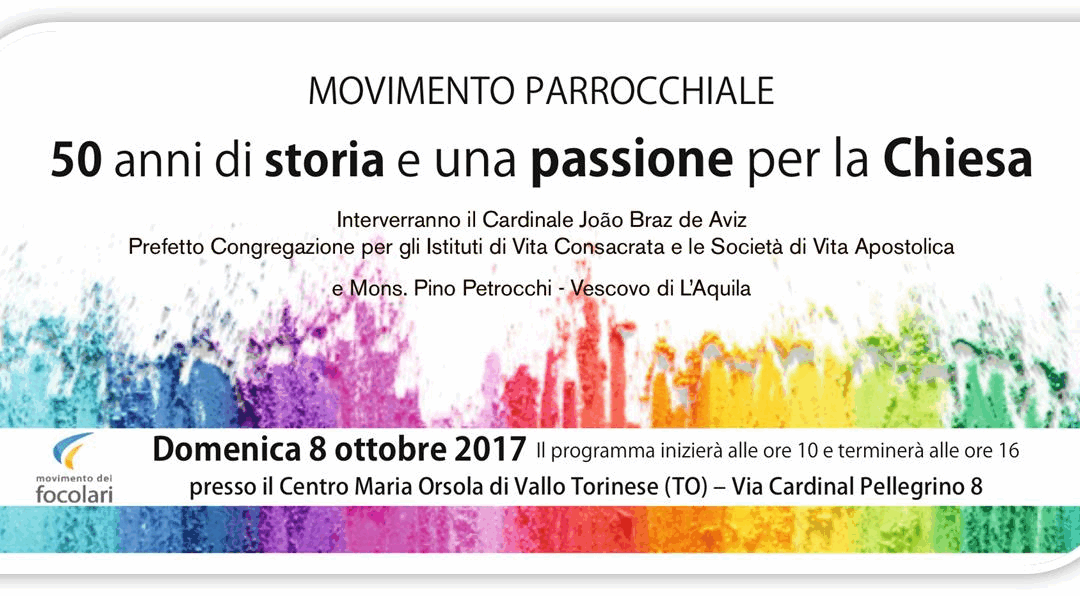
Sep 29, 2017 | Non categorizzato
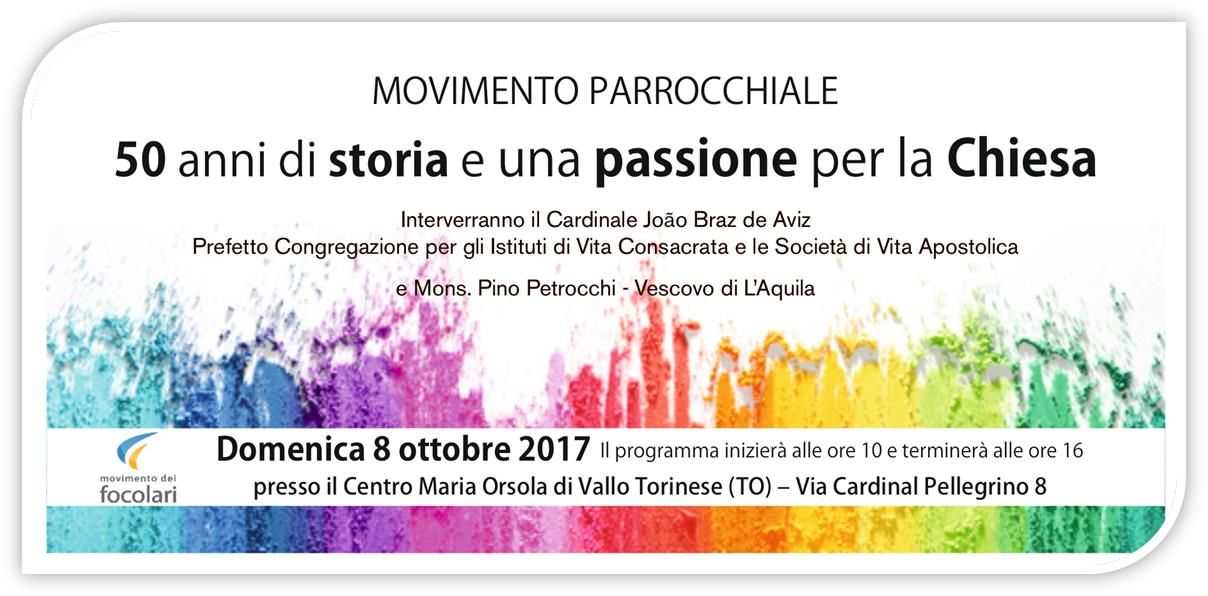 A day-long gathering at Maria Orsola Centre, titled “A Fifty year story of passion for the Church”. Alongside the presentations of a few experiences and artistic interludes, Cardinal Joao De Aviz, prefect of the Congregation for the Institutes of Consecrated Life, once bishop of Brasilia, will give a talk titled From the Peripheries of the World to the Vatican, and Archbishop Giuseppe Petrocchi, bishop of Aquila will talk about The Calling of the Parish Movement in the light of Juvenescit Ecclesia. Press Releases
A day-long gathering at Maria Orsola Centre, titled “A Fifty year story of passion for the Church”. Alongside the presentations of a few experiences and artistic interludes, Cardinal Joao De Aviz, prefect of the Congregation for the Institutes of Consecrated Life, once bishop of Brasilia, will give a talk titled From the Peripheries of the World to the Vatican, and Archbishop Giuseppe Petrocchi, bishop of Aquila will talk about The Calling of the Parish Movement in the light of Juvenescit Ecclesia. Press Releases
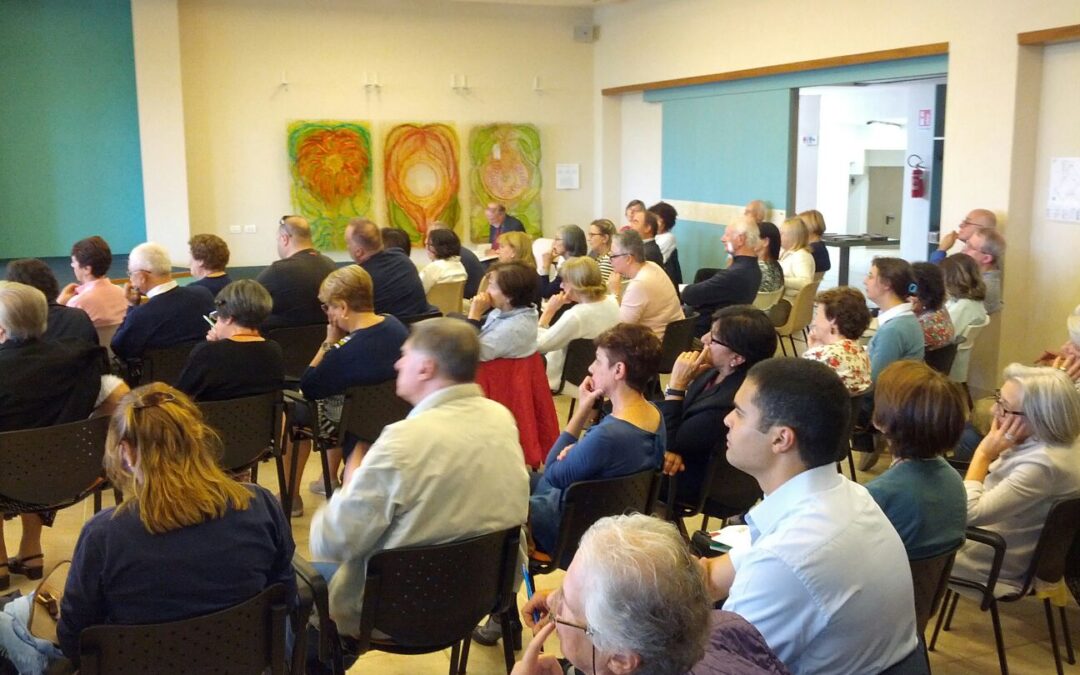
Sep 29, 2017 | Non categorizzato
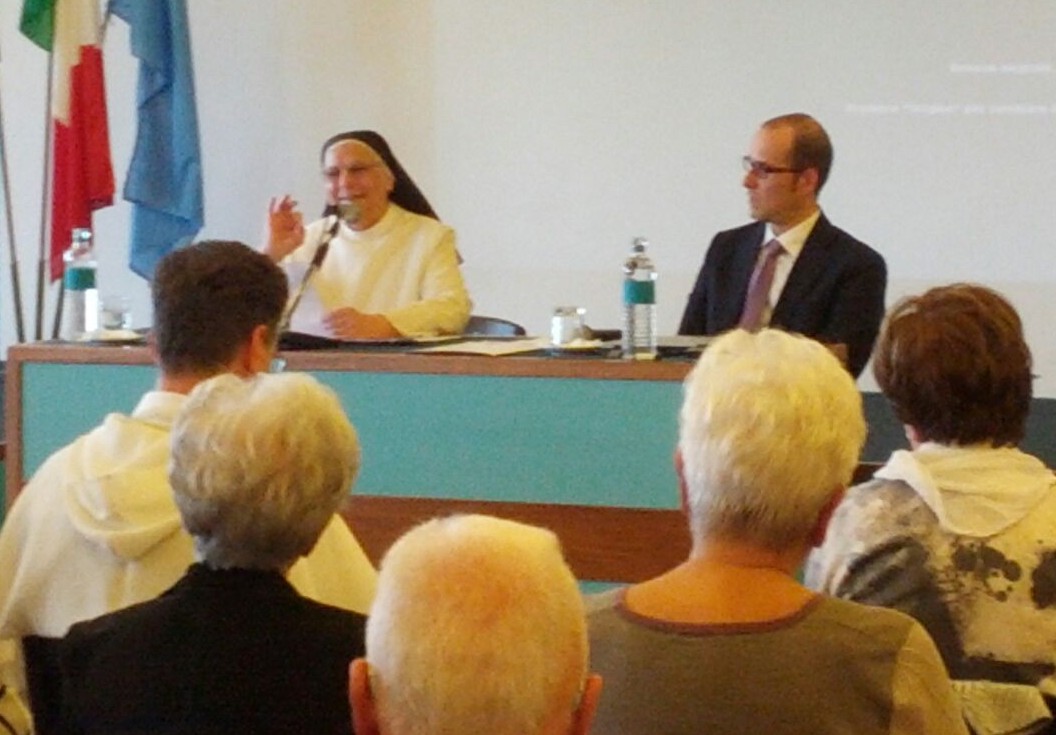 Saturday, 23 September 2017, in the Lecture Hall of the Sophia University Institute (SUI): from the introductory remarks of Mons. Buoncristiani, Archbishop of Siena, and of Maria Voce, President of the Focolare Movement and Vice-Chancellor of the Sophia University Institute, the harmony and the affinity between the two charismatic figures were apparent. These two figures have offered not only the ecclesial space but the whole civil society of their respective periods, an example of a fruitful fusion between spirituality and incarnation, continuously working at the challenges of common living. As Marco Luppi, moderator, opened the conference, he noted the continuity between the proposals of the “happy brigade” of the Catherinites and the spirituality of unity of the Focolare, recalling how various cornerstones of the Saint of Siena’s thought – the uniqueness of the choice of God, the generative value of God’s will, the importance of living the present moment – had been taken up and re-actualized by Chiara Lubich. He recalled that Igino Giordani, co-founder of the Focolare Movement, had initially embarked on the path traced by Caterina’s experience, fascinated by the demonstration of holiness within reach of everyone and the message of universality in her proposal of the Christian choice. The famous connection, “I – my brother – God,” was promoted by Giordani as a fruitful process of interrelation that completes the anthropological dimension with a spiritual openness to divine paternity in Christian meaning. The focal point of the conference was the two main discourses. Sister Elena Ascoli O.P., with her theme “The mysticism of the encounter,” retraced the intimate and concrete dimension of the “mysticism of fire” in Catherine. Christian hope, in the Saint of Siena, becomes a real vocational path in the search for the meaning of living at the service of society and of the Church. 381 letters and numerous collections of hymns and prayers make Catherine the saint of the encounter and of dialogue, animated by the awareness of those who find that the “inner fire,” the relationship with God, represents a patrimony that multiplies its value if it is given, if it builds a relational dynamic of concrete love to one’s neighbour, and if it contributes to the building of associated living in the search for the common good.
Saturday, 23 September 2017, in the Lecture Hall of the Sophia University Institute (SUI): from the introductory remarks of Mons. Buoncristiani, Archbishop of Siena, and of Maria Voce, President of the Focolare Movement and Vice-Chancellor of the Sophia University Institute, the harmony and the affinity between the two charismatic figures were apparent. These two figures have offered not only the ecclesial space but the whole civil society of their respective periods, an example of a fruitful fusion between spirituality and incarnation, continuously working at the challenges of common living. As Marco Luppi, moderator, opened the conference, he noted the continuity between the proposals of the “happy brigade” of the Catherinites and the spirituality of unity of the Focolare, recalling how various cornerstones of the Saint of Siena’s thought – the uniqueness of the choice of God, the generative value of God’s will, the importance of living the present moment – had been taken up and re-actualized by Chiara Lubich. He recalled that Igino Giordani, co-founder of the Focolare Movement, had initially embarked on the path traced by Caterina’s experience, fascinated by the demonstration of holiness within reach of everyone and the message of universality in her proposal of the Christian choice. The famous connection, “I – my brother – God,” was promoted by Giordani as a fruitful process of interrelation that completes the anthropological dimension with a spiritual openness to divine paternity in Christian meaning. The focal point of the conference was the two main discourses. Sister Elena Ascoli O.P., with her theme “The mysticism of the encounter,” retraced the intimate and concrete dimension of the “mysticism of fire” in Catherine. Christian hope, in the Saint of Siena, becomes a real vocational path in the search for the meaning of living at the service of society and of the Church. 381 letters and numerous collections of hymns and prayers make Catherine the saint of the encounter and of dialogue, animated by the awareness of those who find that the “inner fire,” the relationship with God, represents a patrimony that multiplies its value if it is given, if it builds a relational dynamic of concrete love to one’s neighbour, and if it contributes to the building of associated living in the search for the common good.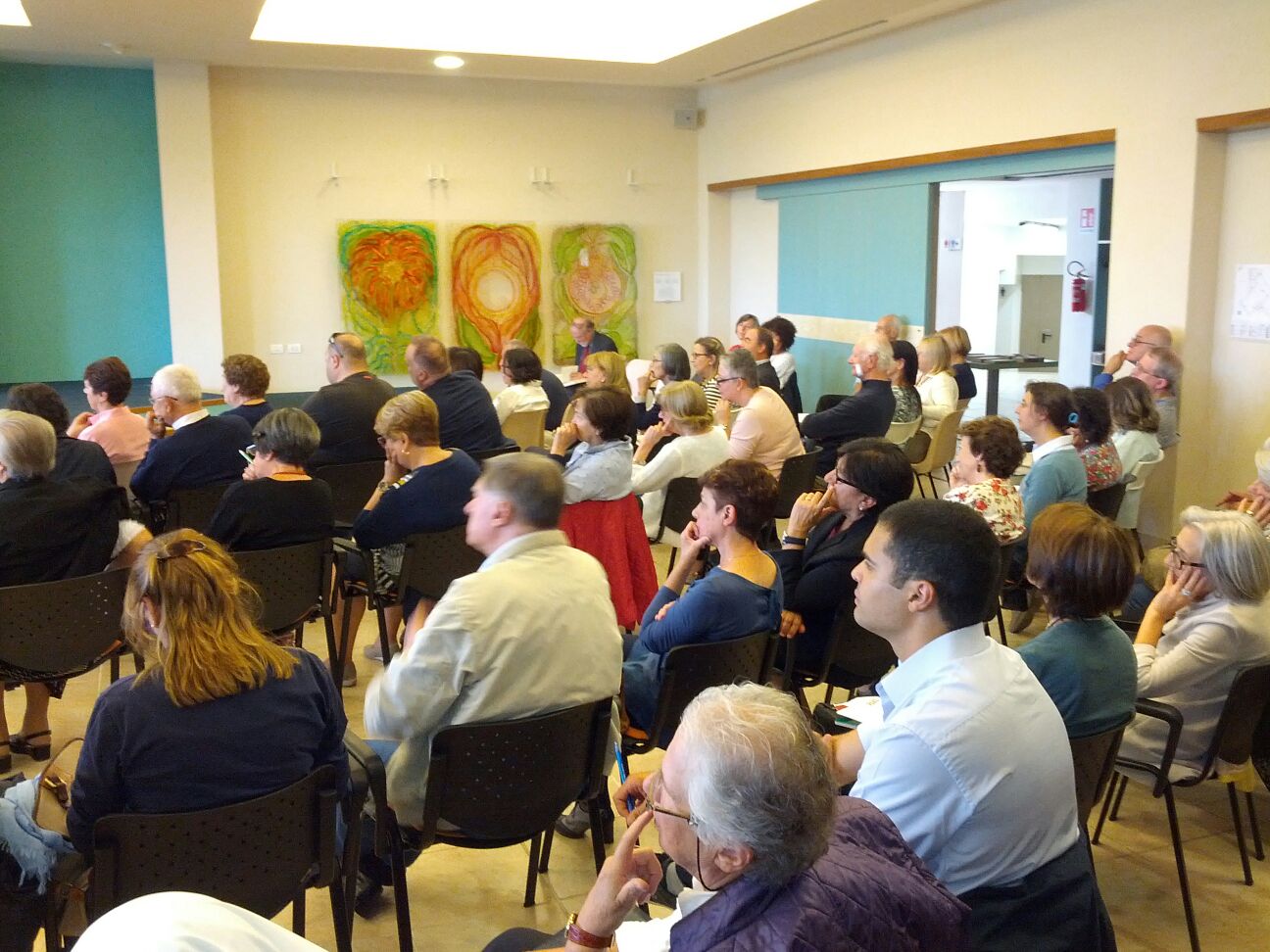 Piero Coda, president of Sophia, in his report titled “Real Love and the One True Love,” proposed an original reading of the generative encounter between the Franciscan roots of Chiara Lubich and the Catherinite period of Giordani, an encounter which reflects an experience of Christian renewal in the foundational period of the Focolare Movement, capable of giving life to a new reality in the Church and in society. The “pact” between charisms generates an originality that emphasises the dynamism of reciprocity as a sounding board for the dimension of unity and becomes the fulcrum of a proposal at the service of humanity. The “mysticism of fire” in Chiara Lubich, recovered by Coda in some passages of her writing, “The Resurrection of Rome,” reminds us how the impetus of inner, individual momentum flourishes in the community dynamics: “It is God who makes two people one, placing himself as the third in a relationship between them: Jesus among us.” In closing, the speech by Dr. Aldo Bernabei, representative of the Roman group of the Catherinites, traced the joint path between his association and the Focolare Movement in the multi-decade animation of the project “Together for Europe,” a demonstration that works steadily to build a European spirit that recognises the Christian soul among its foundation values, a path that joins more than 500 churches, movements, communities and associations.
Piero Coda, president of Sophia, in his report titled “Real Love and the One True Love,” proposed an original reading of the generative encounter between the Franciscan roots of Chiara Lubich and the Catherinite period of Giordani, an encounter which reflects an experience of Christian renewal in the foundational period of the Focolare Movement, capable of giving life to a new reality in the Church and in society. The “pact” between charisms generates an originality that emphasises the dynamism of reciprocity as a sounding board for the dimension of unity and becomes the fulcrum of a proposal at the service of humanity. The “mysticism of fire” in Chiara Lubich, recovered by Coda in some passages of her writing, “The Resurrection of Rome,” reminds us how the impetus of inner, individual momentum flourishes in the community dynamics: “It is God who makes two people one, placing himself as the third in a relationship between them: Jesus among us.” In closing, the speech by Dr. Aldo Bernabei, representative of the Roman group of the Catherinites, traced the joint path between his association and the Focolare Movement in the multi-decade animation of the project “Together for Europe,” a demonstration that works steadily to build a European spirit that recognises the Christian soul among its foundation values, a path that joins more than 500 churches, movements, communities and associations.
Sep 28, 2017 | Non categorizzato, Word of
While St. Paul was in prison on account of his preaching, he wrote to the Christian community in the city of Philippi. He had been the very first to preach the Gospel there, and many people had come to believe and had committed themselves generously to this new life. Even after Paul had left them, they continued to bear witness to Christian love. Knowing this about them made him very happy, which is why his letter is full of affection for the Philippians. Paul encouraged them, therefore, to go ahead and to grow both as individuals and as a community. For this reason he reminded them of their model Jesus, who they should learn from. “Let the same mind be in you that was in Christ Jesus.” What is this “mind”? How can we know the deepest desires Jesus had so as to imitate him? Paul understood how: Jesus Christ, the Son of God, had emptied himself and had come down among us. He became man and was completely at the service of the Father, so that we could become children of God. Paul told the Galatians about this, saying, “And because you are children, God has sent the Spirit of his Son into our hearts, crying, ‘Abba! Father!’” (Gal 4:6). And in fact, John had already written about it in his Gospel: “But to all who received him, who believed in his name, he gave power to become children of God” (Jn 1:12). Jesus had fulfilled his mission through the way he lived his whole life. He continually humbled himself so as to reach those who were the smallest, weakest or most insecure: lepers, widows, strangers or sinners. He raised them up; making them feel loved and saved at last. “Let the same mind be in you that was in Christ Jesus.” In order to recognize and cultivate the mind of Jesus in us, let’s first be aware of his love and the power of his forgiveness. Let’s look to him, making his way of acting our own. It urges us to open our hearts, our minds and our arms to welcome each person just as they are. Let’s avoid making any judgements about others, but allow ourselves instead to be enriched by all that is positive in those we meet, even when it may be hidden in a pile of wretchedness and errors so that it seems to us a “waste of time” looking for it. The strongest desire in the mind of Jesus, which we can make our own, is love freely given, the willingness to be at the service of others with our talents, whether great or small, and to courageously and positively build up good relationships wherever we are. This love knows how to face difficulties, misunderstandings and differences with a gentle spirit, determined to find the ways of dialogue and mutual agreement. “Let the same mind be in you that was in Christ Jesus.” Chiara Lubich let the Gospel guide her entire life, and she experienced its power. In 1982, she wrote, “Imitating Jesus means understanding that we Christians only make sense if we live for others, if we think of our existence as a service for our brothers and sister, if we organize our lives on this basis.” “Then we fulfill what Jesus has most at heart. We will have fully grasped the Gospel. And we will be truly blessed.” Letizia Magri

 To love means taking risks «Some time ago an illiterate 15-year-old boy, already initiated in the activity of theft, started to frequent our home. Many had advised us to be careful in letting him in and to consider if it would not be better to help him but keep him at a distance. We were, however, convinced that Jesus was in him and that we had to love concretely, also to the point of taking a risk. Often that boy remained with us, went out with us and played with our children. After various months, the stealing instinct returned and he stole some money from us. After the first denials he admitted the fact and crying, begged for forgiveness, promising to return what he stole. But above all he became serene knowing that he could continue to count on our friendship and that if he ever needed money, all he had to do was ask. Now he no longer steals and has also found a job.” (D. L. – Italy) Difficult colleague “It seemed that a colleague had started picking on me, and whatever I did, he would go against it. For as long it had to do with small counteraction, I bore up with it. But at times, in the face of important commitments, he would go against everyone. Work had become unbearable. What could I do? The priest I spoke to advised me firstly to free myself from grudges and negative thoughts and try to see my colleague with new eyes. I tried it. Incredibly, at the next work meeting, he had become another person altogether! And evidently it not only depended on him.” (F. L. – Serbia)
To love means taking risks «Some time ago an illiterate 15-year-old boy, already initiated in the activity of theft, started to frequent our home. Many had advised us to be careful in letting him in and to consider if it would not be better to help him but keep him at a distance. We were, however, convinced that Jesus was in him and that we had to love concretely, also to the point of taking a risk. Often that boy remained with us, went out with us and played with our children. After various months, the stealing instinct returned and he stole some money from us. After the first denials he admitted the fact and crying, begged for forgiveness, promising to return what he stole. But above all he became serene knowing that he could continue to count on our friendship and that if he ever needed money, all he had to do was ask. Now he no longer steals and has also found a job.” (D. L. – Italy) Difficult colleague “It seemed that a colleague had started picking on me, and whatever I did, he would go against it. For as long it had to do with small counteraction, I bore up with it. But at times, in the face of important commitments, he would go against everyone. Work had become unbearable. What could I do? The priest I spoke to advised me firstly to free myself from grudges and negative thoughts and try to see my colleague with new eyes. I tried it. Incredibly, at the next work meeting, he had become another person altogether! And evidently it not only depended on him.” (F. L. – Serbia) 




 Saturday, 23 September 2017, in the Lecture Hall of the
Saturday, 23 September 2017, in the Lecture Hall of the  Piero Coda, president of Sophia, in his report titled “Real Love and the One True Love,” proposed an original reading of the generative encounter between the Franciscan roots of Chiara Lubich and the Catherinite period of Giordani, an encounter which reflects an experience of Christian renewal in the foundational period of the Focolare Movement, capable of giving life to a new reality in the Church and in society. The “pact” between charisms generates an originality that emphasises the dynamism of reciprocity as a sounding board for the dimension of unity and becomes the fulcrum of a proposal at the service of humanity. The “mysticism of fire” in Chiara Lubich, recovered by Coda in some passages of her writing, “The Resurrection of Rome,” reminds us how the impetus of inner, individual momentum flourishes in the community dynamics: “It is God who makes two people one, placing himself as the third in a relationship between them: Jesus among us.” In closing, the speech by Dr. Aldo Bernabei, representative of the Roman group of the Catherinites, traced the joint path between his association and the Focolare Movement in the multi-decade animation of the project “Together for Europe,” a demonstration that works steadily to build a European spirit that recognises the Christian soul among its foundation values, a path that joins more than 500 churches, movements, communities and associations.
Piero Coda, president of Sophia, in his report titled “Real Love and the One True Love,” proposed an original reading of the generative encounter between the Franciscan roots of Chiara Lubich and the Catherinite period of Giordani, an encounter which reflects an experience of Christian renewal in the foundational period of the Focolare Movement, capable of giving life to a new reality in the Church and in society. The “pact” between charisms generates an originality that emphasises the dynamism of reciprocity as a sounding board for the dimension of unity and becomes the fulcrum of a proposal at the service of humanity. The “mysticism of fire” in Chiara Lubich, recovered by Coda in some passages of her writing, “The Resurrection of Rome,” reminds us how the impetus of inner, individual momentum flourishes in the community dynamics: “It is God who makes two people one, placing himself as the third in a relationship between them: Jesus among us.” In closing, the speech by Dr. Aldo Bernabei, representative of the Roman group of the Catherinites, traced the joint path between his association and the Focolare Movement in the multi-decade animation of the project “Together for Europe,” a demonstration that works steadily to build a European spirit that recognises the Christian soul among its foundation values, a path that joins more than 500 churches, movements, communities and associations.